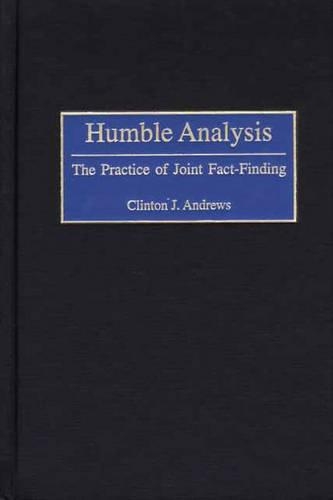
Humble Analysis: The Practice of Joint Fact-Finding
(Hardback)
Publishing Details
Humble Analysis: The Practice of Joint Fact-Finding
By (Author) Clinton J. Andrews
Bloomsbury Publishing PLC
Praeger Publishers Inc
30th May 2002
United States
Classifications
Tertiary Education
Non Fiction
Management and management techniques
Psychology
658.4038
Physical Properties
Hardback
216
Description
Joint fact-finding is a cooperative venture and communication among the participants is critical to success. Analysts have begun to recognize this and have started to adjust their craft to reflect the communicative character of their work. Non-analysts usually judge experts' opinions by their value, effectiveness, and legitimacy rather than soundness of the conclusions. Accordingly, experts must recognize the importance of these non-scientific criteria, and learn to communicate better with their non-expert colleagues. Practically, this means explaining the rationale and implications behind their findings in an easily digestible way. Andrews uses real cases to illustrate his argument that analysts should marry process to analysis, spread information, reason inductively, broaden their analytic scope, put analytic results into lay terms, and constantly seek out feedback on their work. Technical specialists who perform analysis in public settings can turn to Andrews's book for ideas about how to do their jobs more effectively. Scholars interested in the connection between expertise and the process of social learning will find his case study approach useful. Beginning with an analysis of the motivations and concepts at work in the process of joint fact finding, Andrews assesses the challenges analysts face from those who hire them and from their non-expert colleagues. He then illustrates his remarks with case studies of projects that have failed and succeeded. The book concludes by summing up the mistakes learned and elements that make for successful joint fact finding.
Reviews
"Clint Andrews argues that analysts must be willing to listen, explain, and tolerate diverse views....His conclusion that the advance of knowledge depends on successful dialogue and a willingness to explore contrary world views rings true. He goes farther, however, and probes a variety of ways to make sure this happens....Relying on convincing in-depth analyses of key cases to assess the adequacy, value, effectiveness and legitimacy of joint fact finding efforts, he concludes that story telling is probably the most important skill of the humble analyst."-Lawrence E. Susskind Ford Professor of Urban and Environmental Planning Massachusetts Institute of Technology
"Humble Analysis is a welcome contribution to the anti-mastery tradition in contemporary thought. Whereas much of policy analysis tries unsuccessfully to overcome disagreement and uncertainty by brute analytic force, Andrews shrewdly follows Lindblom and others in adapting analysis to cope with the realities of political life....Recognizing that policy analysis becomes usable only when adapted to partisans' perceived needs, Andrews is superb in keeping the focus on how analysts can make their technical tasks compatible with the tasks of maintaining legitimacy and communicating effectively with would-be users of the analysis."-Edward J. Woodhouse Associate Professor of Political Science Rensselaer Polytechnic Institute
"The framework for joint fact finding developed in Humble Analysis offers a very useful perspective for viewing these sorts of cooperative efforts as well as the professional practice of policy analysis more generally. Clinton Andrews taps several streams in the policy sciences literature to give Humble Analysis firm intellectual foundations. He then draws on a rich set of economically presented cases of joint fact finding to offer thoughtful advice about when and how it can be effectively used. Andrews thus provides an important contribution to our understanding of policy analysis and the variety of ways it can be organized. Readers at all levels of experience will appreciate his clear presentation. I highly recommend this book to anyone interested in the practice of policy-related professions."-David L. Weimer Professor of Political Science and Public Affairs University of Wisconsin-Madison
"This important work illustrates how to marry technical expertise and policymaking through joint fact finding, as exemplified by the Office of Technology Assessment before it was abolished in 1995. Nonpartisan analysis is exactly what Congress needs but no longer gets."-Representative Rush D. Holt (D-NJ)
"This is a complete guidebook for analysts interested in contributing to public policy. It explains the inherent difficulty of connecting truth to power. It provides a comprehensive guide to the literature on these difficulties and to various approaches for dealing with them. Finally and most importantly, it tells compelling stories of how some analysts have been able to enter into a productive dialogue with policy makers and the public, have helped break stalemates between interest groups, and have identifies new and better policy options."-Frank N. von Hippel Woodrow Wilson School of Public and International Affairs Princeton University
"This is am impressive and much needed book that productively explores the roles of experts and expertise in science intensive decision arenas. Professor Andrews presents theory and practice in language that is accessible to a broad audience. Anyone who serves as an expert, wants to be a expert, or listens to experts will benefit from his ideas."-David M. Hassenzahl Assistant Professor of Environmental StudiesUniversity of Nevada, Los Vegas
Author Bio
CLINTON J. ANDREWS is Assistant Professor at the Edward J. Bloustein School of Planning and Public Policy at Rutgers University. His previous works include Regulating Regional Power Systems (Quorum, 1995), and Industrial Ecology and Global Change (Cambridge, 1995).
